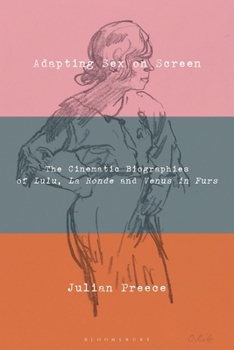Adapting Sex on Screen: The Cinematic Biographies of Lulu, La Ronde and Venus in Furs
Sex has always been cinema's most contested territory. Adapting Sex on Screen traces that battle through three once scandalous source texts: Leopold von Sacher-Masoch's Venus in Furs (1870), Arthur Schnitzler's La Ronde (1900), and Frank Wedekind's Lulu plays (1895-1904), following the history of their reception from fin de si cle Central Europe to the USA in the twenty-first century, with a focus on their screen adaptations.
Julian Preece shows how directors such as Max Oph ls, G. W. Pabst, and Roman Polanski tested understanding of transgression, whether in the Weimar Republic, under the Hays Production Code, or in the shadow of AIDS and the wake of second-wave feminism. His broad international corpus ranges from heritage cinema to arthouse and exploitation to Hollywood, allowing him to explore the contradictions between commodification and critique, and chart evolving attitudes towards alternative sexualities and minorities. Preece blends adaptation and translation studies with transatlantic cultural history to show how filmmakers have both reflected and shaped social change, from the first Lulu film made in Germany in 1917 to the most recent La Ronde, made in New York precisely one hundred years later.Format:Hardcover
Language:English
ISBN:1350538132
ISBN13:9781350538139
Release Date:January 2026
Publisher:Bloomsbury Academic
Length:280 Pages
Weight:1.11 lbs.
Dimensions:1.1" x 1.1" x 1.1"
Customer Reviews
0 rating





